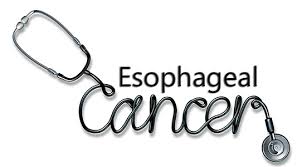Esophageal cancer
Esophageal cancer is cancer that occurs in the esophagus — a long, hollow tube that runs from your throat to your stomach. Your esophagus carries food you swallow to your stomach to be digested.
Esophageal cancer usually begins in the cells that line the inside of the esophagus. Esophageal cancer can occur anywhere along the esophagus, but in people in the United States, it occurs most often in the lower portion of the esophagus. More men than women get esophageal cancer.
Causes
It’s not clear what causes esophageal cancer.
Esophageal cancer occurs when cells in your esophagus develop errors (mutations) in their DNA. The errors make cells grow and divide out of control. The accumulating abnormal cells form a tumor in the esophagus that can grow to invade nearby structures and spread to other parts of the body.
Types of esophageal cancer
Esophageal cancer is classified according to the type of cells that are involved. The type of esophageal cancer you have helps determine your treatment options. Types of esophageal cancer include:
- Adenocarcinoma begins in the cells of mucus-secreting glands in the esophagus. Adenocarcinoma occurs most often in the lower portion of the esophagus. Adenocarcinoma is the most common form of esophageal cancer in the United States, and it affects primarily white men.
- Squamous cell carcinoma.The squamous cells are flat, thin cells that line the surface of the esophagus. Squamous cell carcinoma occurs most often in the middle of the esophagus. Squamous cell carcinoma is the most prevalent esophageal cancer worldwide.
- Other rare types.Rare forms of esophageal cancer include choriocarcinoma, lymphoma, melanoma, sarcoma and small cell cancer.
Risk factors
It’s thought that chronic irritation of your esophagus may contribute to the DNA changes that cause esophageal cancer. Factors that cause irritation in the cells of your esophagus and increase your risk of esophageal cancer include:
- Drinking alcohol
- Having bile reflux
- Having difficulty swallowing because of an esophageal sphincter that won’t relax (achalasia)
- Drinking very hot liquids
- Eating few fruits and vegetables
- Having gastroesophageal reflux disease (GERD)
- Being obese
- Having precancerous changes in the cells of the esophagus (Barrett’s esophagus)
- Undergoing radiation treatment to the chest or upper abdomen
- Smoking
Symptoms
Signs and symptoms of esophageal cancer include:
- Difficulty swallowing (dysphagia)
- Weight loss without trying
- Chest pain, pressure or burning
- Worsening indigestion or heartburn
- Coughing or hoarseness
Early esophageal cancer typically causes no signs or symptoms.
Complications
As esophageal cancer advances, it can cause complications, such as:
- Obstruction of the esophagus.Cancer may make it difficult or impossible for food and liquid to pass through your esophagus.
- Advanced esophageal cancer can cause pain.
- Bleeding in the esophagus.Esophageal cancer can cause bleeding. Though bleeding is usually gradual, it can be sudden and severe at times.
Homoeopathic Treatment
The scope of Homeopathy for cancer management varies depending on the type of cancer, stage of cancer and the general health of the patient. Following are some of the aspects of Cancer management with Homeopathy:
- One of the most distressing complaints associated with some varieties of Cancer is the agonizing pain. Conventional medicines can provide pain relief but only to a certain extent and these medicines are not without any side effects. Moreover there is always a restriction to the dosage that can be safely administered to the patient. The advantage of administering Homeopathic medicines in such cases is that there can be effective pain control without inducing any side effects.
- Homeopathy can help in improving the general well being and vitality of the patient.
- Conventional treatment options for cancer (chemotherapy, radiotherapy, etc) are associated with distressing side effects and homeopathy can play a definitive role to counter these side effects.
- The diagnosis of cancer often leaves the patient with a sense of depression, anxiety and fear. The treatment may induce additional irritability, impatience and mood fluctuations. Homeopathy can influence the psyche of the patient and help him to deal with these emotions in a better way.
- Homeopathic medicines may also have a role to play in controlling the pace at which the disease increases and spread of the disease to other organs.
Homeopathic medicines can also be administered along with the allopathic medicines.

